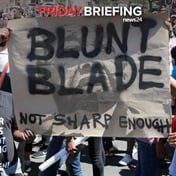
There are few audiences more influential than the one President Cyril Ramaphosa faced down on Monday morning when he delivered the keynote address at the annual Financial Times Africa Summit in London.
Held in the exclusive Claridge's Hotel in Mayfair, the event was billed as an opportunity for some of the world's most influential executives and fund managers to interact with African heads of state and to discuss opportunity, collaboration and solutions.
Ramaphosa, seemingly trying his best to keep South Africa afloat, not only delivered the keynote but also sat down with the Financial Times's (FT) respected editor, Lionel Barber, a journalist who has always been well-disposed towards South Africa and the post-apartheid democratic project.
In his address Ramaphosa, acting as an emissary from Africa for large parts of his speech, spoke of the opportunities the continent presents for investors, how free trade and open borders will benefit the African economy, what the continent needs (and doesn't) need and how good governance and democracy are top of mind for African governments.
READ | #Ramatracker: The Ramaphosa report card - Hard work, but little to show for it
He acknowledged the scourge of grand corruption in South Africa but explained that his government is doing its utmost to right the wrongs and to ensure that much needed investment can come back to a stable and predictable environment.
But it was his tête-à-tête with Barber that was more telling, and read alongside an interview he gave The Economist's John McDermott the day before, reveals a growing impatience outside of the country's borders with the lack of symbolic and visible progress to claw back the losses from the past decade.
Sitting down next to Ramaphosa on stage in one of the Claridge's ballrooms, Barber carefully – as one does with a head of state – started to prod Ramaphosa on his reforms, euphemistically declaring the president to be "a practitioner of strategic patience".
And then: "How much time do you have?"
"Not long," Ramaphosa responded, with a grin, before explaining how institutions like the National Prosecuting Authority (NPA) and the South African Revenue Service (SARS) were "almost destroyed" but that they and other crucial bodies are on the road to recovery.
"I am now more confident than in the past that they (these institutions) are poised (to take action)," Ramaphosa said.
He explained soon-to-be-announced plans to restructure Eskom's spiralling debt, how the executive and board will be strengthened, that debt collection will be improved and how government will try and persuade Moody's that all is on track. And he added that government is already in conversation with private equity partners to see what can be done to safeguard SAA's future.
Capture and corruption (Barber referred to the era under Zuma as the "lost decade") were "huge, much bigger than imagined," Ramaphosa said. "But the important thing is we stemmed the bleeding…"
McDermott, for The Economist, also pushed Ramaphosa about his reform strategy, but judging from the paper's headline ("South Africa's president promises big results – eventually") it is not convinced. Ramaphosa spoke of creating consensus so that when everyone leaves the negotiating table everyone feels they've won.
Yes, he acknowledged, sometimes there will be losers when negotiating and driving reform, but he wants to prevent calamity.
And that's Ramaphosa's weakness. Barber needled him with his "strategic patience" remark before the president admitted that he doesn't have a lot of time to drive reforms. And then he told McDermott consensus is at the centre of his strategy, not calamity.
But what South Africa needs, while drifting on a sea of contradictory policy, poor governance and destructive politics, buffeted by winds of indecision, is determination and doggedness.
As Ferial Haffajee pointed out on Fin24 on Tuesday, significant progress in stabilising various institutions have been made, commissions were instituted and leadership changes effected.
But if Ramaphosa is going to create the enabling environment in which business can thrive, where citizens are empowered and governance is effective then consensus is a nice-to-have.
He is correct that he doesn't have time. The medium-term budget policy statement will be delivered at the end of the month and if Finance Minister Tito Mboweni's honest diagnosis of our national ills – spiralling debt, a bloated civil service, governance and spending – aren't turned into action then the lost decade will be extended.
Barber prodded Ramaphosa, McDermott was probing. Both were unconvinced.
As are many South Africans.




 Publications
Publications
 Partners
Partners























